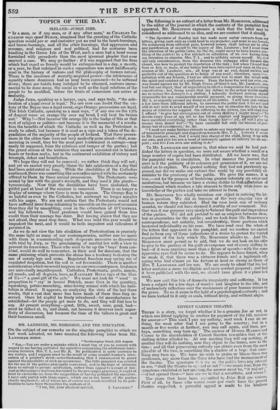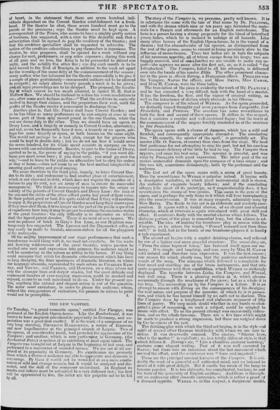COVENT GARDEN THEATRE.
THERE is a story, we forget whether it be a genuine Joe or not, in which one friend applying to another for payment of his bill, receives for answer—" This week I pan say nothing, next week I can do no- thing, the week after that I am going to the country ; but in a month or five weeks at farthest, you may call again, and then, per- haps, something may turn up." The answer of Messrs. HARRIS and CoNsr to the shareholders of Covent Garden resembles that of the shifting debtor alluded to. At one meeting they will say nothing, at another they will do nothing, now they object to the terms, now to the time ; and all that persevering entreaty can obtain even'frorn the most placable of the two, is something like a shadow of a hope that some- thing may turn up. We have no wish to praise or blame these two gentlemen, any more than the three who have had the management of the theatre. The questions that we or the public have any interest in are, "shall the theatre be opeaed or not ?"—we much fear, from thc.• symptoms exhibited at last meeting, the answer must be, "it wiilnot —if not opened then—" how are we to had a substitute, and where ? The plans that have been sill:milted to John Bull are various First of all, by those who would coute qui coute have the present theatre supported, a powerful appeal is made to his kindirs
of heart, in the statement that there . are .seven hundred . indi- viduals dependant on the Covent Garden establishment for a liveli- hood. If the -theatre be shut, these seven hundred .must go to the
parish or the provinces ; ergo the theatre must be kept open. A correspondent of the Times, who seems to have a mighty pretty notion
of business, has suggested, with a view to this desirable end, that a
subscription shall be opened to pay:the creditors of the theatre ; and that the creditors specialiter shall be requested to subscribe. The
notion of the creditors subscribing to pay themselves is ingenious. The
theatre, he also proposes, shall be opened for a week without any charge for rent, performers, or any other expenses ; during this week of all gain and no loss, the King is to be persuaded to attend one night, and the nobility the other five ; one day each month is to be held sacred to the God of Receipts, in addition to the week set apart for the worship of the same deity at the commencement of the season ; every author who has laboured for the theatre successfully is to give it a couple of plays gratuitously—unsuccessful authors not to be allowed to compete ; no salary above twenty pounds a week is to be given ; -anctall legal proceedings are to be dropped. The proposal, the feasibi- lit tof which cannot be too much admired, is signed M. R. that is Mathe*Raw. We should be inclined to reduce his seven resolutions to one, after some such fashion as this—" That the creditors be earnestly invited to forego their claims, and the proprietors their rent, until the profits of the tlieatre.render it convenient to discharge them." Another pIan is, that Mr. PRICE shall lease Covent Garden ; and as he hes Wee. as many performers as he can employ at once in one house, part of them may mount guard in the one theatre, while the rest are doing day in the -other. Thus we should have an opera in
Drury Lane, at* a..tragedy or comedy in Covent Garden, alternately; and not, as we too frequently have it now, a tragedy or an opera, per- haps the same tragedy or opera, in both houses on the same night. This would not perhaps be a had plan, except for the players who would be kept to double duty ; but we do not see how it would serve the seven hundred, for its whole merit consists in carrying on two houses with one establishment. Besides, to give to the lessee of Drury, spirited as he is, the power of saying to the public, "if you want dia- logue you must come here ; if you, want song, you must go over the way,"—and to leave to the public no alternative but to obey his orders or stay at home,—does not seem to us the best method imaginable of insuring good acting and good singing. We conic therefore to the third plan, harnely, to leave. Covent Gar- den to its fate ; and endeavour to find another place of entertainment, .which is not drowned in debt, which does not require the sacrifice of a fortune to pay its rent, nor an army of men to ensare its successful management. We think it unnecessary to inquire into the origin or validity of the patents of Covent Garden and Drury Lane : the ruin of the one and the debts of the other afford pretty fair proof of their value... Be their patent good or bad, it is quite evident that if they will continue to enjoy it, the proprietors of Covent Garden must keep tl wir doors open. If they once shut them, it is no longer on the part of the public a question of expedience how lung it may be proper to continue the exclusive rights of the great theatres : the only difficulty is to determine on whom shall the lapsed patent devolve. There is no need of new houses. We need no palaces of brick in Gray's Inn Lane, as our Brighton con- temporary has suggested. The Lyceum and the Haymarket offer, or may easily be made to furnish, accommodation for all the playgoers of the metropolis.
Of the mighty improvement' of our stage performances that such a transference would bring with it, we need not expatiate. In the waste and howling wildernesses of the great theatres, unless passion be swelled into rant and expression into grimace, the audience might as well be sauntering in the saloon as sitting in the boxes. If any thing could reinspire that relish for dramatic entertainment which has been
so long decaying, the finer speeimens of dramatic literature, in which our language abounds, represented by such actors as CHARLES KEM- BLE, and YOUNG, and IARREN, and DOWTON, on a stage where not
only the stronger lines and deeper shades, but the most delicate and evanescent touches of ever-varying expression, could be marked and
enjoyed, seems to us well calculated to do so. Under the preeent sys- tem, anything like natural and elegant acting is out of the question. The actor must caricature, in order to please the audience, where, without the exaggeration of caricature, the passion he strives to paint would not be perceptible.



















 Previous page
Previous page